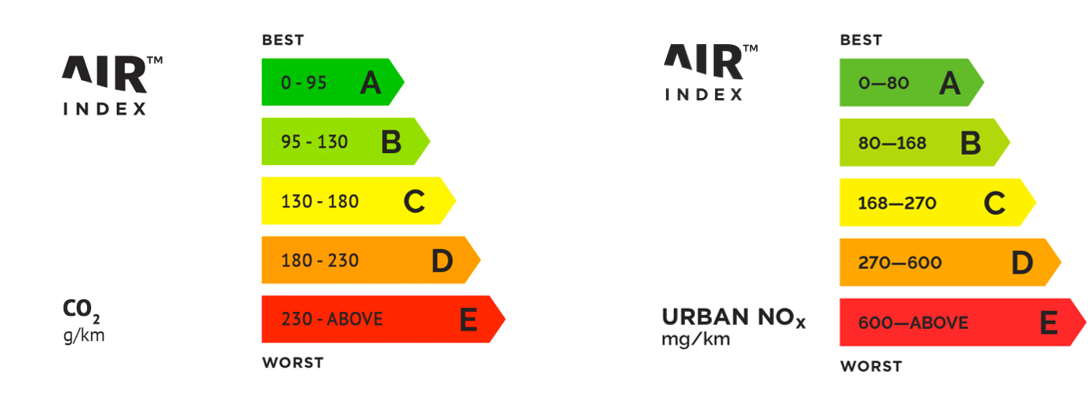Scrappage stimulus scheme will sustain jobs but could also improve air quality if based on actual vehicle emissions
- Qualifying cars to be scrapped should be ‘D’ or ‘E’ rating on the AIR Index
- Subsidised cars should be in the ‘A-C’ rating on the AIR Index
- The AIR Index: trusted, independent and scientifically robust ratings www.airindex.com
4 June 2020 – The AIR Alliance (AIR) today welcomed the debate launched by the Society of Motor Manufacturers and Traders (SMMT) to introduce a scrappage stimulus scheme to remove older, higher emitting vehicles and replace them with clean, new technology but cautioned that it must be based on actual vehicle emissions to also achieve the greatest impact on improved air quality and reducing climate change.
The cars which have the most negative impact on air quality produce NOx emissions in excess of 270 mg/km (the legal limit for new cars is 80 mg/km). These cars are rated ‘D’ and ‘E’ on the AIR Index for urban NOx.
The cars which have the most significant impact on reducing climate change produce CO2 below 180 g/km. These cars are rated ‘A’, ‘B’ and ‘C’ on the AIR Index for CO2.
AIR proposes that any scrappage or stimulus scheme should have conditions applied to both the car being taken off the road and recycled and the new cleaner car being introduced:
Old Car Requirement
To qualify for a scrappage payment, the car being recycled must be at least a ‘D’ or preferably an ‘E’ rating on the AIR Index. This will ensure that vehicles which are causing the most damage to air quality and climate change are removed.
New Car Requirement
To qualify for a scrappage payment, the new car must be ‘A’ rated on the AIR Index for urban NOx, and at least a ‘C’ (but ideally an ‘A’ or ‘B’) on the AIR Index for CO2.
The SMMT proposal reported in the media today, suggests a £2,500 contribution from tax payers for up to 600,000 new vehicles and would require a budget of £1.5 billion. According to media reports, SMMT claims this would deliver a financial return of 3:1 for the UK economy.
AIR believes that the best use of public funds will be achieved by also improving air quality and climate change at the same time by removing the most polluting vehicles.
Massimo Fedeli, co-founder of AIR said: “A scrappage scheme will certainly maintain jobs but can also deliver an improvement in air quality and help to address climate change. The greatest impact will be achieved if the most polluting cars are removed and recycled, and if the lowest emitting new cars are purchased. Any scrappage scheme must be based upon the actual emissions from cars, not simply the laboratory-test results which can be a factor of 20 different to the actual tailpipe pollution during on-road driving.
“The AIR Index ratings for both urban NOx and CO2 provide accurate and independent information to enable a scrappage scheme that is effective and efficient. We estimate that the scrappage programme being discussed could save an additional 200,000 tonnes of CO2 each year if the AIR Index ratings are used to select the cars being scrapped, and the new cars being funded.”
Notes to editors:
AIR carries out an ongoing programme of vehicle testing, and results are added to the AIR Index periodically.
Inspiration for the AIR Index was NCAP, the independent vehicle-safety rating system developed in the US in the 1970s that became the industry standard in the EU and around the world. The programme held car makers accountable for their safety performance, resulting in a voluntary adoption of technologies that led to safer vehicles.
AIR tests at least two different cars or vans of each model, sold and on the road, sourced independently from the vehicle makers in a scientifically robust programme of on-road trips which lead to an emissions rating in the AIR Index.
The rating of each vehicle uses the latest methodology CWA 17379 developed at European level to fairly compare the emissions performance of different vehicles using portable emissions monitoring systems (PEMS) to ensure that the technology provides trusted data on emissions that is transparent and available to everyone.
The AIR Index ratings for urban NOx and CO2 are colour-coded as follows:
